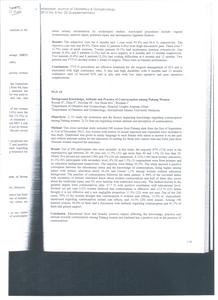Husin, Roziah and Abdulwahab, Dalia F and Mohamed, Norlidar and Mat Ali, Nor Huda and Ismail, Rozihan
(2013)
Background knowledge, attitude and practice of contraception among Pahang women.
Malaysian Journal of Obstetrics & Gynaecology, 8 (22).
pp. 119-20.
ISSN 0128-6013
Abstract
Objectives:
1. To study the knowledge awareness regarding contraception among women from Pahang..
2. To identify the most popular method of contraception in use.
3. To find out the common reasons for the less frequent use of contraception.
4. To asses factors impacting knowledge in the use of contraception.
METHOD
This cross sectional study included 200 women from Pahang state from the first of September to 31st of December 2012. Any women with history of sexual exposure and consented were included to this study. Questioner was given in malay language to each female who asked to answer it on the spot and without assistant unless for the indication of reading for those who cannot read and write(just three illiterate women required the assistant).
RESULT
Out of 200 participants who were included in this study, the majority 87%(174) were in the reproductive age between 20- 40 year old, 11.5%(23) age more than 40 and 1.5%(2) less than 20.
Ninety five percent are married(190) and 5% (10) are unmarried. A 53% (106) have tertiary education, 41.5(83) participants with secondary level. Four percent(8) and 1.5%(three) responder were from primary and no education background respectively.
Majority of the responder were Malay 185(92.5%), Indian 2.5%(five),Chinese 1.5 %(3) and 3.5% (7) others.
There is positive correlation between the educational status and the knowledge of contraception, being higher among ladies with tertiary education about 54.2% and lowest 1.1% in among women without education background. The practice of contraception followed the same pattern.
Almost 50%(97/200) of respondents were aware of modern contraception,only the minority (4/200) only aware of tradisional contraception and the other 50%(99/200) were know both type of contraception.
Among the respondents 76%( 152/200) were believed that contraception were effective. and 12.5%(25/200) were not effective and a nonnegligible proportion 11.5%(23/200) were not sure. A large number of women 70%(140/200) stated that no contraception side effects, 15.5%(31/200) talking about that and 14.5%( 29/200) were unsure. Educational level had broadly positive impact on the mentioned attitude.
The method known to the greatest degree were contaceptives pills 27.7%(46),condom 15%(25) and combinations method. Among all the women 22.5%(38) choosed other method of contraception.
A total of hundred respondents were not using any contraception method in this study, 52%(52) due to inconvenience side effects 12%(12) related to medical problems and 36%(36) because of other reasons.
Among 190 married women, 88.9% of them had a discussion with husband regarding contraception and 87.1%(148) had gained support from husband. Out of these 70.5%(134) agreed to practise contraception in future.
CONCLUSION
Educational level had significant impact on the knowledge ,attitude and practice of contraception among Pahang Women with majority of them gained husband support.
Actions (login required)
 |
View Item |
![[img]](http://irep.iium.edu.my/31327/7.hassmallThumbnailVersion/background_knwoledge.jpeg)



 Download Statistics
Download Statistics Download Statistics
Download Statistics